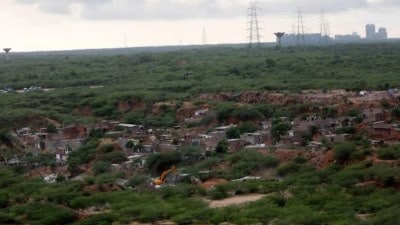Pune: PMC urges citizens not to pollute water bodies during Ganesh festival, puts up tanks for idol immersion
The PMC said it has put up 46 concrete tanks and 359 steel tanks at 177 locations for people to immerse the idols.
 The Ganesh festival is set to be celebrated from August 31 to September 9. There have been concerns over idols made of clay, plaster of paris and paint being immersed in natural water bodies polluting the water and adversely affecting aquatic life. (Express)
The Ganesh festival is set to be celebrated from August 31 to September 9. There have been concerns over idols made of clay, plaster of paris and paint being immersed in natural water bodies polluting the water and adversely affecting aquatic life. (Express)The Pune Municipal Corporation (PMC) has urged citizens to make sure Ganeshotsav is celebrated in an environment-friendly manner so that water bodies are not polluted with the immersion of idols or dumping of floor waste. It urged them to immerse the idols in water tanks it has put up at various locations and mobile water tanks.
The Ganesh festival is set to be celebrated from August 31 to September 9. There have been concerns over idols made of clay, plaster of paris and paint being immersed in natural water bodies polluting the water and adversely affecting aquatic life.
“Citizens are being appealed to not to immerse idols in natural water bodies but in other facilities which are being provided by the PMC across the city,” said Asha Raut, in-charge of the civic solid waste management department.
Raut said the PMC has put up 46 concrete tanks and 359 steel tanks at 177 locations for citizens to immerse the idols. “There will be around 200 mobile water tanks moving around the city. The citizens should take maximum benefit of the facility.”
The PMC will set up collection centres at 191 locations where citizens can donate the idols instead of immersing them, Raut said. There will be collection centres for floral waste at all the locations where the idol immersion facility is being provided
There are plans of reusing the sand used for making idols, Raut said, “Many organisations have come forward to reuse the sand. The sand is a limited resource and its excavation affects the environment adversely. Also, the immersion of sand idols in natural water body increases the sludge and affect aquatic life. Thus, the sand will be given to sculptures for reuse. The collection centres for sand idols can be checked on http://www.punaravartan.org.”
The PMC also urged citizens to segregate the floral waste and not mix it with food waste which is used to create manure supplied to farmers.







